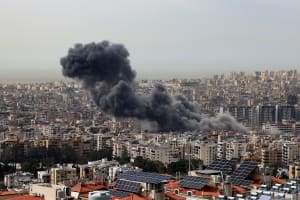Israel strikes in Beirut again to stop ‘imminent terror attack’ by Hezbollah & Hamas
Pinpoint strike hits upper three floors of apartment building while leaving the glass on lower floors intact

Israel Defense Forces attacked the Lebanese capital of Beirut for the second time in four days, striking a Hezbollah operative who directed an “imminent terror attack against Israeli civilians” with the help of Hamas terrorists.
According to an IDF statement on Monday evening, the Israeli Air Force, with help from the Shin Bet domestic intelligence, struck a target in Dahiyeh, the southern Beirut suburb that serves as Hezbollah’s stronghold.
“The strike targeted a Hezbollah terrorist who had recently directed Hamas operatives and assisted them in planning a significant and imminent terror attack against Israeli civilians. Due to the immediate threat the terrorist posed, the IDF and ISA acted to eliminate him and removed the threat,” read the statement.
צה"ל תקף בדאחייה בביירות מחבל חיזבאללה שהכווין פעילי חמאס לבצע "פיגוע חמור" pic.twitter.com/VKGWEdggTe
— כאן חדשות (@kann_news) April 1, 2025
A source close to Hezbollah told AFP that the target was the deputy to the group’s commander overseeing the Palestinian file, confirming the IDF’s account.
In a later statement, the IDF, Shin Bet and Mossad confirmed that the target was Hassan Ali Mahmoud Bdeir, "a terrorist in Hezbollah's Unit 3900 and the Iranian Quds Force."
Israeli Foreign Minister Gideon Sa'ar said Bdeir was "a ticking bomb in terms of a planned attack in the immediate future... This case is an example of cooperation between Iran, Hamas and Hezbollah on Lebanese soil to carry out a terrorist attack against Israelis."
Israel expects the Lebanese government "to act against the terrorist elements that operate from their territory against us," Sa'ar added.
The Lebanese Health Ministry reported that at least three people were killed and seven were wounded in the strike.
According to Reuters, the attack was a pinpoint strike, damaging only the upper three floors of an apartment building while leaving the glass on lower floors intact.
On April 1, a nine-story building in Dahieh, Beirut, was attacked from the air. The top three floors were severely damaged.
— Israel-Alma (@Israel_Alma_org) April 1, 2025
According to the IDF spokesman, the target was a Hezbollah operative who had directed Hamas operatives and assisted them in attempting to carry out a… pic.twitter.com/kef7QtZbDi
Unlike the Israeli strike in Beirut last Friday, where an IDF announcement caused mass panic as thousands of residents fled, the IDF didn’t issue a prior warning this time. Following the strike, local residents again fled to other parts of Beirut, Reuters reported.
The two strikes were the first in the Lebanese capital since the start of the ceasefire.
Lebanese leaders once again condemned the Israeli strikes. President Joseph Aoun spoke of “premeditated intentions against Lebanon.”
He added, “Israel's persistence in its aggression requires us to exert more effort to address Lebanon's friends around the world and rally them in support of our right to full sovereignty over our land.”
“We will work with the government and its prime minister to thwart any attempt to waste this exceptional opportunity to save Lebanon.”
Lebanese Prime Minister Nawaf Salam called the strike “a blatant violation of UN Resolution 1701 and a clear violation of the arrangements related to the ceasefire agreement.”
Despite this, the United States continued to express support for Israel. According to Reuters, the State Department said Israel was acting in self-defense and attributed the resumption of hostilities to “terrorists.”
“Hostilities have resumed because terrorists launched rockets into Israel from Lebanon,” the State Department stated.
Friday’s strikes came in response to the latest rocket launch.
Hezbollah has denied responsibility for the rocket launches. On Monday, the Saudi newspaper Asharq Al-Awsat reported that authorities had arrested 13 suspects in connection with the attacks – eight Lebanese, four Palestinians, and one Syrian– some of whom have prior criminal records.
On Saturday, Hezbollah Secretary-General Naim Qassem accused Israel of violating the ceasefire, but instead of threatening Israel, he emphasized the responsibility of the Lebanese state.
“Since the ceasefire agreement, the state of Lebanon is responsible for confronting this occupation within diplomatic frameworks,” Qassem said.
Only if “Israel does not meet the demands, and if the state does not achieve the desired result, we will have no choice but to return to other options,” he added.

The All Israel News Staff is a team of journalists in Israel.
You might also like to read this:
















